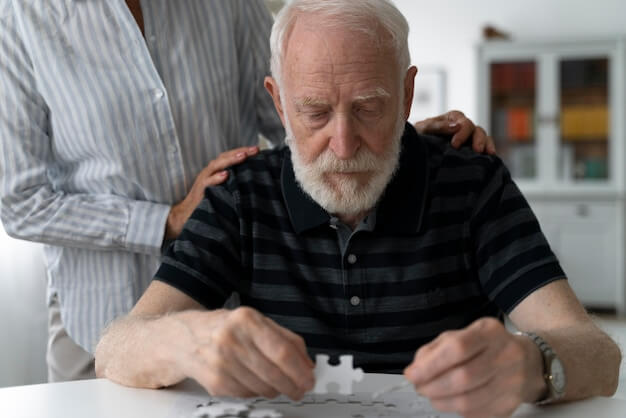Every September is the "World Alzheimer's Disease Month". In 2022, the theme of "World Alzheimer's Disease Month" is "Know Dementia, Know Alzheimer's - Another, we can do so much". It aims to continue to focus on early screening and early diagnosis, and focus on publicizing the 10 early symptoms, 12 risk factors that can be intervened and medical and social support after diagnosis of Alzheimer's disease, so as to achieve the goal of overall management of Alzheimer's disease
So, what is Alzheimer's disease? Let's get to know Alzheimer's disease.
1、Overview of Alzheimer's disease
Commonly known as Alzheimer's disease, it is characterized by hidden onset and progressive deterioration of cognitive function, and is often accompanied by emotional and personality changes, which ultimately seriously affect the ability to daily life. The earliest and most prominent clinical symptom is memory decline. It is not a normal aging process, and the symptoms continue to develop. The course of the disease is usually 5-10 years, or even longer. At present, there is no specific drug for treatment, but it can still delay the progress of the disease through active treatment of multiple drugs and non drug cognitive intervention, improve the clinical symptoms, and maintain the self-care ability of Alzheimer patients as much as possible, Preserve their quality of life and dignity, and reduce the burden and energy of caregivers.

2、What are the early manifestations of Alzheimer's disease?
The clinical manifestations of Alzheimer's disease are characterized by diversity. Here is a summary of the top ten early manifestations of AD to help people better identify it.
- Memory gradually declines, affecting daily living activities.
For example: to do things carelessly; Forget to add salt or add more salt when cooking; Forgot to turn off the gas after dinner; Forgot to lock the door when going out; Performance such as forgetting to pay for food or taking things after paying.
- It is difficult to handle familiar things and be competent for daily affairs.
For example, I don't know the order of wearing clothes. I often wear underwear outside, or even wear clothes indiscriminately; It turns out that skilled housewives do not know the steps of cooking, do housework at a loss, and so on.
- Difficulties in language expression.
Naming barriers, forgetting simple words, words fail to convey the meaning, often saying wrong words and sentences, saying or writing sentences that people can not understand, or even few words, silence
- Confused with time, place and people.
I don't remember today's date and day of the week, and I don't know where I am; I will get lost in familiar places; Don't know friends or even family members; I don't know where my home is; I think I'm still young and I need to find my parents
- Judgment gradually waned.
Wearing clothes out of season, such as cotton padded jacket in the hot sun and thin clothes in the cold winter; Usually thrifty people are fooled into buying health care products at a high price; Because I can't judge, I often do dangerous acts
- The ability to understand or reasonably arrange things decreases.
They don't understand what others say or do, can't keep up with their ideas of talking, or can't pay bills on time, and can't do things in a proper way.
- They often misplace things in inappropriate places.
Put the iron in the refrigerator; The electric kettle is placed on the gas stove to boil water; Pick up a lot of garbage outside and put it at home, and put your socks in the cupboard
- Emotional instability and abnormal behavior.
For example, emotions rise and fall rapidly and become moody; Day and night are reversed; Running outside all day without going home; There are even delusions of persecution.
- Character changes.
The generous people are stingy; When the personality becomes suspicious, stubborn, indifferent, anxious or rude, the family will feel that the old man suddenly becomes unreasonable.
- Lose the initiative to do things.
As a result of the decline in daily ability, the elderly will feel that they are killing time all day long, have no interest in previous hobbies, are prone to depression, feel that it is boring to live, and even tend to commit suicide

3、 How to prevent Alzheimer's disease?
Alzheimer's disease is a complex disease. Although we do not know the specific mechanism of its occurrence at present, through the exploration of scientists for decades, we believe that there are still some means to prevent and intervene in daily life, that is, the twelve prevention methods of Alzheimer's disease:
- Reduce the intake of sugar, salt and oil
- Drink little or no alcohol
- Eat foods rich in choline
- Eat foods containing vitamin B12
- You have to be seven times full to eat
- Use your brain frequently
- Don't smoke
- Actively participate in sports and maintain normal social activities
- Eat more
- Actively prevent constipation
- Move your fingers frequently
- Try not to use aluminum tableware
4、 How to diagnose Alzheimer's disease?
It is necessary to conduct medical history, clinical manifestations, neuropsychological cognitive assessment, necessary imaging examinations (CT, MRI+hippocampal coronal position, SPECT, PET), laboratory examinations (blood routine examination, blood biochemistry, erythrocyte sedimentation rate, thyroid function, AIDS, syphilis, folic acid B12, cerebrospinal fluid testing, gene chromosome and other examinations), of which neuropsychological cognitive examination is still the preferred method for clinical diagnosis.
5、 Who needs cognitive screening?
Suspicion of their memory decline; Have a family history of dementia positive; Memory decline found by family members or familiar people; Behaviour and character change gradually, such as not caring about hygiene, picking up garbage and being indifferent; Can't understand what others say or speak indistinctly, nagging and repeating; People with early manifestations of Alzheimer's disease such as getting lost and getting lost in a familiar environment.
6、 In which department is memory screening performed?
In order to facilitate the treatment of patients with memory disorders and dementia, and to further carry out the health education, evaluation, diagnosis, treatment, management and care of patients with memory disorders, the geriatric department of our hospital has opened a special outpatient clinic for memory disorders on March 6, 2019, referred to as the memory outpatient clinic. Xu Chunfeng, deputy director of the geriatric department, attends the clinic every Wednesday afternoon to protect your memory, We will also regularly carry out education on early prevention and treatment of patients with memory disorders, train caregivers of patients with memory disorders in conventional care skills, hold free clinics on dementia days and doctor-patient family fellowship, and welcome patients and their families to come for consultation.
Sometimes cure, often help, always comfort. We will work hand in hand for the future. The prevention, treatment and whole process management of Alzheimer's disease require the joint participation of you, me and him to become the main force of this action. This is also the social concept that ADC/CAWA has always advocated.
